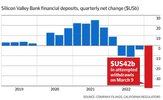- Joined
- 28 August 2022
- Posts
- 7,035
- Reactions
- 11,391
Will it be a case of bang, bust and harboom coming. Have the boffins got their eyeballs on the gane or just to busy playing golf etc.not just cryptos , but many speccie stocks that specialize in tech and healthcare






